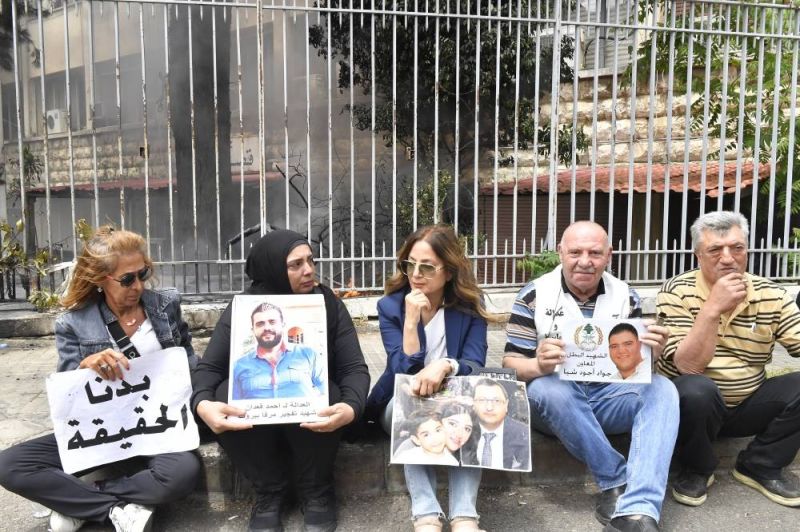
Relatives of the people killed in the 2020 Beirut port explosion protest in front of the Beirut Justice Palace. (Credit: Hussam Shbaro)
Want to get the Morning Brief by email? Click here to sign up.
The Lebanese investigation into Banque du Liban governor Riad Salameh can now continue after the judiciary rejected several appeals by the central bank chief, a judicial source told L’Orient Today. Beirut First Investigating Judge Charbel Bou Samra rejected appeals filed in late March by Salameh, his brother Raja and his former advisor, Marianne Hoayek. Abou Samra also set a hearing with Raja Salameh for June 15. The three face charges of “forgery, money laundering, illicit enrichment and tax evasion.” The rejection of the appeals comes after the French judiciary on Tuesday issued an international arrest warrant for Salameh, who had missed his hearing in Paris the same day. Next Tuesday, the French judiciary is scheduled to discuss a demand to restitute tens of millions’ worth of assets in France linked to Salameh, which were allegedly purchased with embezzled BDL funds. Yesterday, caretaker Deputy Prime Minister Saade Chami and 10 MPs called for Salameh’s dismissal. In an interview with Al Hadath, Salameh said he would step down if he is found guilty.
Activist William Noun threatened that protests held by relatives of the Aug. 4, 2020 Beirut port blast victims will become “more violent” if the probe into the tragedy does not resume by next week. Noun, whose brother Joe, a firefighter, was killed while responding to the blast, gave the ultimatum from a protest outside the Beirut Justice Palace. It was intended as a “warning to the Higher Judicial Council.” Noun and several others were arrested in January for participating in a protest outside the Beirut Justice Palace that escalated into clashes with security forces. The activist justified his “commitment to protest peacefully,” citing the “example” set by Lebanon’s top prosecutor, Ghassan Oueidat, who Noun claimed “broke the law” by releasing detainees held in connection to the blast. In January, Oueidat released 17 people arrested in the aftermath of the blast in response to lead investigator Judge Tarek Bitar’s attempt to relaunch the probe, then-frozen for over a year, despite outstanding complaints against him. The blast probe was paralyzed by dismissal requests against both Bitar and the judges assigned to rule on the same requests. A ruling cannot be issued until quorum is restored to the plenary chamber of the Court of Cassation, which has been missing the necessary members for over a year. The port blast killed more than 220 people, injured over 6,500 others and decimated swathes of the capital.
Protesters gathered outside the German Embassy in Beirut to oppose the raising of a rainbow flag to commemorate the International Day Against Homophobia, Biphobia and Transphobia (IDAHOT). “Not only today, but every day, we raise the rainbow flag in front of our buildings in Beirut in solidarity with LGBT+ people in challenging times,” German Ambassador to Lebanon Andeas Kindl said in a tweet thanking security forces for “protecting the integrity of a diplomatic mission.” Some social media users criticized the embassy’s commemoration of IDAHOT, including a man affiliated with the radical Christian group “Soldiers of God” who appears in a video calling for the removal of the “flag of the devil.” Last year during pride month, members of the group tore down a billboard of flowers arranged into the rainbow flag. Following the incident, caretaker Interior Minister Bassam Mawlawi attempted to ban LGBTQ+ events.
General Security in a statement urged “those who are not in an immediate need to request a passport to let those who are most in need get priority,” as demand for travel documents remains high after the resolution of a monthslong shortage. The statement said the body is receiving 5,000 demands daily, 2,000 over its capacity, while 80 percent of newly issued travel documents go unused. In March, General Security began accepting passport requests without requiring appointments after most citizens could not file requests for months due to yearlong wait times that had formed on the digital booking platform. A general security spokesperson denied to L’Orient Today that the platform would relaunch. Nonetheless, General Security affirmed that it had “enough passports to meet all the requests inside Lebanon and in foreign countries.”
In case you missed it, here’s our must-read story from yesterday: “Lebanon, a haven for the wanted?”
Compiled by Abbas Mahfouz